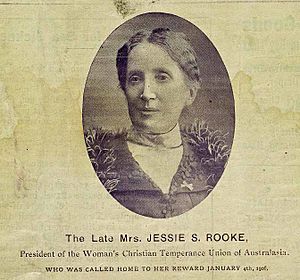Jessie Rooke facts for kids
Jessie Spink Rooke (born September 10, 1845 – died January 4, 1906) was an important woman in Tasmania, Australia. She was a suffragette, which means she worked hard to get women the right to vote. She was also a temperance reformer, meaning she supported efforts to reduce alcohol use for a healthier society. Jessie Rooke was one of the first women from Tasmania to become well-known outside her home state.
Contents
Early Life and Family
Jessie Rooke was born in London, England, on September 10, 1845. Her parents were William Walker and Catherine Scollay. Later, Jessie moved to Melbourne, Australia.
In 1867, she married Peter Charles Reid, who was from New Zealand. After he passed away, she married Charles Rooke on August 14, 1883. Charles was a widower, meaning his first wife had also passed away.
Moving to Tasmania
In the early 1890s, Jessie and Charles Rooke moved to Tasmania. Jessie quickly became involved in community work. She joined the Burnie branch of the Woman's Christian Temperance Union (WCTU). This group worked to improve society, often by promoting less alcohol use and supporting women's rights. In 1894, Jessie Rooke was chosen to be the president of the Burnie WCTU.
Fighting for Women's Right to Vote
The WCTU became a leading group in Tasmania's fight for women's voting rights, also known as the suffrage campaign.
Working with Other Leaders
In 1896, Jessie Rooke traveled around Tasmania with another important suffrage leader, Georgina Kermode. They held public meetings for women, raised money for their cause, handed out flyers, and collected signatures for a petition. This petition asked the government to allow women to vote. It was given to the Tasmanian parliament at the end of 1896.
Jessie Rooke went on another tour of Tasmania in 1898. This time, she traveled with Elizabeth Nicholls from South Australia. They visited 30 towns and collected even more signatures for a new petition.
Achieving the Vote
Even though bills to give women the vote were defeated in 1896 and 1897, the hard work paid off. In 1903, the Electoral Act was passed. This important law finally gave Tasmanian women the right to vote!
Leadership Roles
Jessie Rooke continued to be a strong leader. In 1898, she became the president of the Tasmanian WCTU branch. Her leadership skills were recognized even further when she became the president of the Australian WCTU in 1903.
In 1902, Jessie Rooke was a delegate at the International Council of Women Conference in Washington, D.C., in the United States. This shows how important she was on a global level. In 1903, she also started the Tasmanian Women's Suffrage Association. This group helped get women ready to vote in the upcoming elections.
Jessie Rooke remained president of the WCTU until she passed away in 1906. She died from congestive heart failure. Her dedication helped bring about significant changes for women in Australia.
See also
 In Spanish: Jessie Rooke para niños
In Spanish: Jessie Rooke para niños
 | Janet Taylor Pickett |
 | Synthia Saint James |
 | Howardena Pindell |
 | Faith Ringgold |


